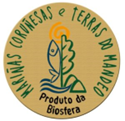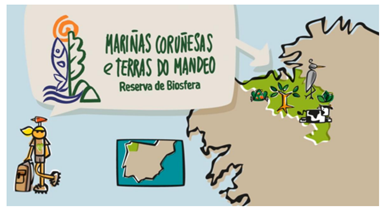Authors: Local Action Group “Mariñas-Betanzos” and Fundación Juana de Vega.
Offering our children quality food and balanced menus is a duty of society, and the school canteen service can become another educational space to convey values such as healthy eating, based on environmentally friendly production and marketing.
Through the EcoComedores initiative, the school canteens located in the Biosphere Reserve Mariñas Coruñesas e Terras do Mandeo (https://en.unesco.org/biosphere/eu-na/marinas-corunesas-terras-mandeo) and its surrounding areas, will have the opportunity to use local organic products (belonging to the Biosphere Reserve own brand) to prepare their menus.

The initiative was promoted by the Local Action Group “Mariñas – Betanzos”, managing the LEADER programme in partnership with the regional government, within the framework of the CAP (2014-2021) and supported by EAFRD funds.
The LAG was constituted in July 2008 with the aim of being the core of integration and representation of the different territorial, institutional, social and economic agents, both public and private, interested in promoting the development of the territory of action.
The Association will have as preferential scope of action the municipalities of Abegondo, Aranga, Arteixo, Bergondo, Betanzos, Cambre, Carral, Cesuras, Coirós, Curtis, Culleredo, Miño, Irixoa, Oleiros, Oza-Cesuras, Paderne, Sada and Sobrado.
The initiative seeks the collaboration of all the agents involved (students, teachers, kitchen staff, families, producers, administrations, companies, etc.) so that priority is given to local, seasonal and organic food, thus improving the nutritional balance of the school menu, promoting the local economy, the socio-economic development of the environment and contributing to the mitigation of climate change.
The Mariñas Coruñesas e Terras do Mandeo Biosphere Reserve sits by the Atlantic Ocean, in Galicia, occupying 116,000 hectares, formed by the hydrographic basins of the Mero and Mandeo rivers. With 200,000 inhabitants, it is one of the most populated Reserves in Spain. Historically, the territory was the main food provider for the city of A Coruña.
However, in recent decades many agricultural lands have been abandoned, which has led to depopulation in rural areas, and, consequently, the risk of fires, loss of biodiversity and traditional landscape.
Mariñas Coruñesas is creating a Local Food System. It promotes organic agriculture as an employment opportunity among young people. In past years, it included different initiatives:
- The identification of areas for production for people who want to work; the creation of a food processing workshop.
- The promotion of seasonal and local products.
- The creation of an own brand for local products.
- The identification of employment opportunities (fruit production, orchard).
- The development of marketing circuits.
- The establishment of eco-canteens in schools.
- The promotion of the recovery of traditional varieties, or the use of useful fauna on farms (nest boxes, insect hotels).
Since 2014, more than 500 people have been trained, 45% of them women, with a job creation rate of 30%. Currently, 25 companies are members of the Reserve’s own brand, and work is underway to incorporate these products into the local hotel industry.
https://en.unesco.org/mab/strategy/goodpractices#sdg8spainmarinascorunesas

Start and current situation of the EcoComedores project
In 2015, a pilot programme was launched for the introduction of organic menus in schools in the area of the biosphere reserve.
Within the framework of this work, it was possible to offer one organic menu to around 800 pupils from three schools in the Biosphere Reserve Mariñas Coruñesas e Terras do Mandeo during the 2014-2015 academic year.
A total of eleven local organic producers took part in the initiative. This project became a catalyst for the subsequent supply of organic products to some schools in the area by enabling contact with the schools, involving the kitchen staff, organising the farms and improving logistics.
As a result of this collaboration between the Biosphere Reserve and organic farms, several certified farms began to join forces and try to offer a common service to schools that trusted the initiative. Thus, in 2017, the Producers’ Association ALEGA was created to organise production and synchronise it with the needs of the schools.
Throughout 2017 and 2018, work was carried out to train producers and kitchen staff, gradually increasing awareness of the objectives pursued. Crops were planned annually and purchasing and distribution systems were organised to reach a peak of 15 schools involved for a total of 2,600 menus served at the start of the 2019-2020 school year.
The purchasing system has evolved from the initial simple telephone contact between producers and schools to a spreadsheet in the cloud. Nowadays the project is in the process of defining a virtual purchasing “marketplace” structure. This online marketplace should facilitate the centralisation of supply and demand in order to improve the service for all parties involved. If this initiative proves to be effective, the next phase would be to assess the technical and economic feasibility of a potential physical purchasing centre.
This project is being supported for the years 2021 and 2022 by the Carasso Foundation (https://www.fondationcarasso.org/es/), through its Sustainable Food Programme.

